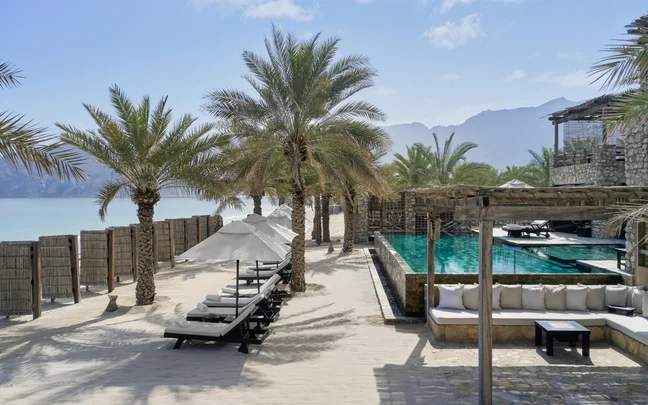Sense of Oman: Through a Woman's Eyes
Oman’s hospitality is as warm as its sunsets, and its people take humble pride in extending it. The northern Musandam region lies above the UAE between the Persian Gulf and the Gulf of Oman. Nature is raw and largely untouched, and communities are isolated. Most of the population is concentrated in the capital Khasab in the north and the small port town of Dibba. A short 20-minute drive up and over the starkly beautiful Hajar mountains from Six Senses Zighy Bay, this is where we’re headed this morning.
New building, new ambitions
As we approach Dibba, the recent rain has filled the reservoir, and the herds of nimble goats bleat their delight at the ensuing green shrubs. With a cheery honk of the horn, we pull over at a small café. My guides for the day, Six Senses Zighy Bay’s tenacious Sustainability Ambassadors Armand Thieblemont and Maher Al-Ryami order us a Karak. This is a curious mixture of black tea steeped in cow’s milk with sugar, cardamon, and saffron. As I sip, Maher gives me a little background about the Dibba Women Association. “The initiative started in a house as the women gathered to share a coffee and catch up on the news. Over time, they started a nursery for children from the surrounding mountains so that the mothers could continue to work. In 2015, they petitioned the Government for a permanent building, and this is what you see in front of us. Since then, we have built a strong relationship with them in terms of supporting the Association. Our new Sense of Oman guest experience is the next step towards them becoming even more self-sufficient as guests will support the Association firsthand, with all proceeds funding their infrastructure development projects and facilities for children.”
Math for the kids, marketplaces for the mums
Under the guidance of Manal Abdullah Al Shehiya and Abeer Ibrahim Al Shehiya, the Association now hosts 13 teachers and up to 120 preschool children aged between 4 and 7. They come to play and learn Arabic, English, and mathematics. We pass posters of the revered modernizer and negotiator, former Sultan Qaboos bin Said, and a glass-fronted cabinet proudly displaying copious awards from business and development associations. There’s also one from the Oman Swimming Association, for some reason, that was never fully explained. As we enter the main hall, we’re met with music, the smell of freshly cooked flatbreads, and the sight of women gathered around small tables displaying their handicrafts.
A progressive government and economic diversification beyond the oil fields have led to entrepreneurship and enterprise. The women sell locally, supplying the hospital with cakes and sweets, and also globally through successful social media marketplaces. Older women teach younger women how to sew at a bank of fierce-looking sewing machines. The materials used are vibrant, as most women wear a colorful dress over trousers (sirwal) and a headdress (lihaf). In public, it is usual to wear an abaya, a modest black.
Communicating without saying a word
An additional beauty accouterment is henna. Henna leaves have been mashed into a paste and used as a natural dye on the hands and feet of ladies for centuries. These days, henna is not just used for auspicious events but for any occasion to express joy. It was fun to sit and exchange a communal language of twinkling eyes with one of the ladies as she carefully marked an intricate pattern of flowers across my hands.
I’m not a coffee lover, but Maher persuades me that the aromatic scent of freshly brewed coffee (or Qahwa) bridges the gap between people and fosters friendship among them. Who am I, therefore, to argue? “Qahwa occupies a special place in Omani society,” he says. “People use it as a greeting. The etiquette in northern regions is to first eat Halwa or dates before drinking Qahwa. If you give the cup straight to the person, they will pour some more coffee into it, so when you’ve had enough, you shake it first.” The coffee was strong. I shook my cup.
The humble date in Oman makes up 78 percent of the crops produced. This is considered to be a pioneering project in the Sultanate due to the expected outcome it will achieve economically, socially, environmentally, and nutritionally. Along with the date, the date palm is essential for buildings and furnishings alike, from shaded roofs to decorative mats, bags, pots, and wall hangings. Without its signature date palms, Six Senses Zighy Bay would indeed fall to the ground! As I watch the ladies at work on their beautiful homewares, I have to remind myself that I am traveling with hand luggage only.
Along with tables bursting with local spices, including aromatic cloves and cardamon that can be crushed to order (and sealed in non-plastic pots), is another famous attraction – frankincense – extracted from the Boswellia sacra tree. Established as early as 1600 BC, the Incense Route linked the Mediterranean world to Arabia, India, and beyond. In addition to its aromatic fragrance and use as incense, frankincense resin has been used for its great restorative qualities since time immemorial.
Leaving with a new perspective
From the tactile materials to the taste of the dates, the smell of the spices, the sound of the music, and the sight of a glorious hubbub of women, Sense of Oman indeed hits all the senses. “You’re forgetting the sixth sense,” says Maher. “The intuitive feeling that what you are experiencing here today is women empowering women.”
Related Stories

Gather together in our Arabian palaces of wonders
Now you can bring everyone together, whether for milestone birthdays with the family or celebrations with groups of friends. Our newly renovated Retreats and Private Reserve enjoy the privacy of a secluded and self-sufficient enclave yet with all the benefits of our resort amenities and experiences.
